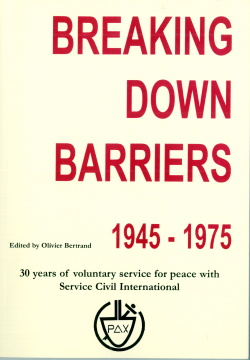Influences
At least five major sources of inspiration could be mentioned at the beginning of SCI :
- Henry David Thoreau (1817-1862) the American philosopher who published a book on Civil Disobedience and was jailed for a short period for refusing to pay taxes which he did not find justified. He seems to have inspired a number of actions of civil disobedience until our time: the Danish resistance to the Nazis, the struggle against Apartheid in South Africa for instance. During the 70’s, he was re-discovered by a new generation of activists against war;
- William James (1842-1910), another American philosopher, whose writings were read by Pierre Cérésole. During a conference in 1906, he suggested to create a civil service for all young people, to replace the military service . The idea was to enrol for the servic of peace “the enthusiasm and the heroic qualities of the young people”.
- Leon Tolstoy (1828-1910), the famous Russian writer, published from 1904 (First revolution) different anti-militarist and non-violence brochures, which had a great impact. He corresponded with Gandhi. Romain Rolland (1866-1944), French writer, Nobel Prize of literature in 1915, was among the very few who stood against the war. He published in 1914 a collection of writings for peace, where he wrote: “A great nation assaulted by war does not have only its borders to defend, but also its reason”. He went to India and established a close relationship with Gandhi.
- Of course, Gandhi (1869-1948) was a major source of inspiration and (as mentioned above) was met by Pierre Cérésole both in Switzerland and India. During the same period, he was using a non violent approach to fight against the British colonization. But he could not avoid the bloody partition which took place with Pakistan in 1947.
At a more practical level, Pierre had also the opportunity to observe the experiences of civil service implemented in Scandinavian and Anglo-Saxon countries, of voluntary services practiced by the Quakers and the refusal of military service by a Swiss compatriot: J. Baudraz. Nevertheless, the workcamp organized near Verdun in 1920 remains the first practical example of a voluntary service, with international participation, conceived as a substitute for the military service .
It was important to look back at these origins to have a good understanding of the spirit which inspired the creation of SCI, but also some of the issues which were raised by the early implementation of the concept, issues, which will be mentioned again in the following pages.
Footnotes
- On this question, see: Jean-Pierre Petit: Service Civil International: Quel héritage ? Approches
- Internet site: thoreau.eserver.org.
- The Moral Equivalent of War " Speech given at Stanford University, 1906. :
“I do not believe that peace either ought to be or will be permanent on this globe, unless the states, pacifically organized, preserve some of the old elements of army-discipline. A permanently successful peace-economy cannot be a simple pleasure-economy. If now -- and this is my idea -- there were, instead of military conscription, a conscription of the whole youthful population to form for a certain number of years a part of the army enlisted against ...
Such conscription, with the state of public opinion that would have required it, and the many moral fruits it would bear, would preserve in the midst of a pacific civilization the manly virtues which the military party is so afraid of seeing disappear in peace. We should get toughness without callousness, authority with as little criminal cruelty as possible, and painful work done cheerily because the duty is temporary, and threatens not, as now, to degrade the whole remainder of one's life. I spoke of the "moral equivalent" of war. So far, war has been the only force that can discipline a whole community, and until an equivalent discipline is organized, I believe that war must have its way. But I have no serious doubt that the ordinary prides and shames of social man, once developed to a certain intensity, are capable of organizing such a moral equivalent as I have sketched, or some other just as effective for preserving manliness of type. It is but a question of time, of skilful propagandism, and of opinion-making men seizing historic opportunities. - Hélène Monastier, in J.P. Petit: Le service civil.
- Arthur Gillette: One Million Volunteers. Penguin, 1968.



